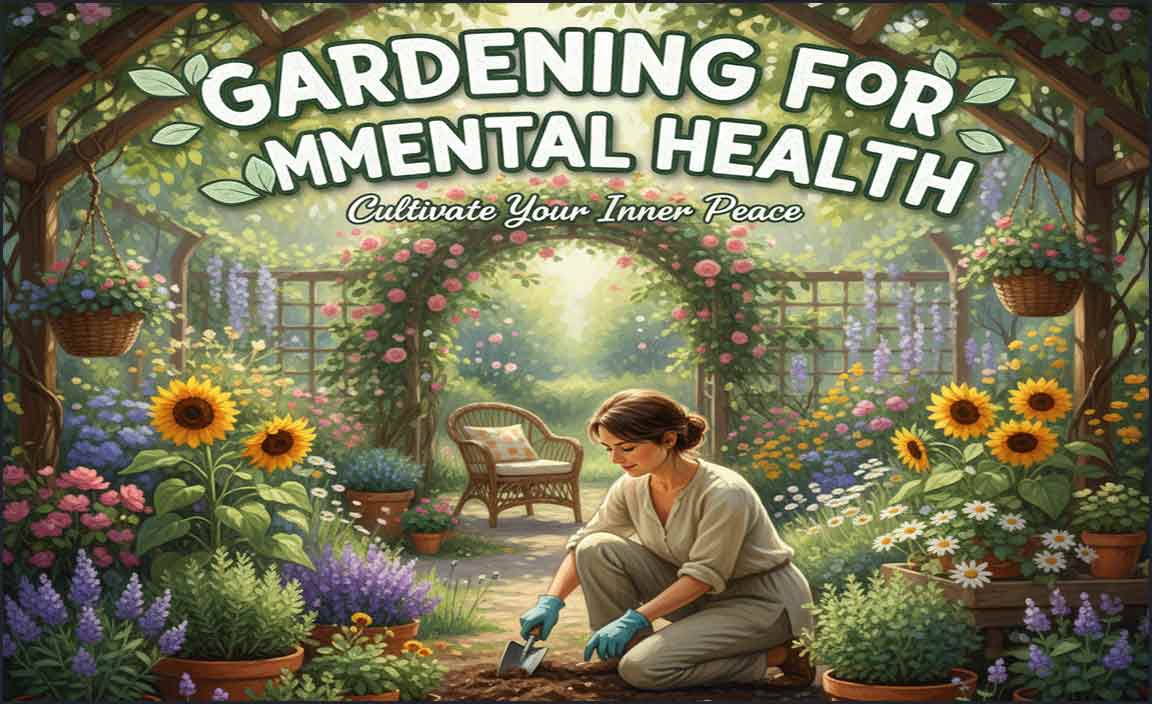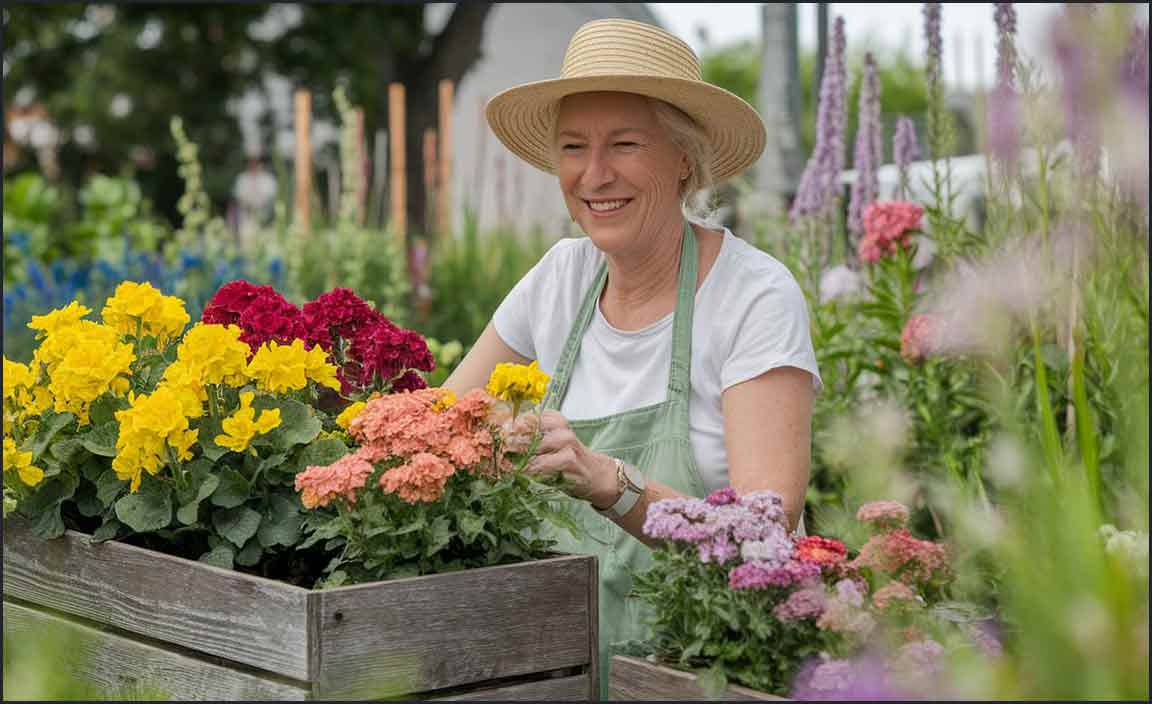Have you ever felt happy while planting flowers or watering a garden? Gardening goes beyond just growing plants; it can lift your spirits.
Imagine digging your hands into the dirt and feeling the earth’s warmth. With each seed you bury, you might feel your worries fade away. Gardening for mental health is a growing trend. Many people find it helps them feel calm and focused.
Did you know that spending time in nature can reduce stress? Research shows that working with plants can lead to a happier mindset. Whether you have a big yard or just a small pot on your balcony, you can start your own little green space.
In this article, we will explore how gardening can improve your mental health. We will share tips, advice, and inspiring stories. So grab your gardening gloves, and let’s dig in!

Gardening For Mental Health: Nurturing Wellbeing Through Nature

Benefits of Gardening for Mental Health
Reduction of stress and anxiety levels. Improvement in mood and overall emotional wellbeing. Gardening is like a magical stress-buster! Digging into the soil can help reduce anxiety and turn frowns upside down. Believe it or not, spending time with plants can lift your mood faster than your favorite candy! Studies show that people who garden feel calmer and happier. Plus, watching your little green friends grow gives a sense of achievement, like winning a tiny trophy. Happier gardeners? Yes, please!
| Benefits | Details |
|---|---|
| Stress Reduction | Gardening lowers cortisol levels, our stress hormone. |
| Improved Mood | Connecting with nature boosts joy and positivity. |
Types of Gardening for Mental Health
Community gardening and its social benefits. Indoor gardening as a therapeutic practice. Growing a garden can be super fun and good for your brain! Community gardening brings people together. You plant seeds, share stories, and maybe even some tasty veggies. This social time boosts happiness, like planting joy in each other’s hearts.

Indoor gardening is like giving your home a breath of fresh air. It calms your mind as you watch your plants grow. You can even talk to them, but they won’t talk back—sorry! It’s a great way to relax and feel accomplished. Gardening really is a natural mood booster!
| Type of Gardening | Benefits |
|---|---|
| Community Gardening | Builds friendships and reduces stress |
| Indoor Gardening | Enhances focus and lifts spirits |
Practical Tips for Starting a Gardening Habit
Selecting the right plants for beginners. Creating a space for gardening at home. Starting a gardening habit can be fun and good for your mind! First, pick easy-to-grow plants like pothos or succulents. They don’t need much care but will still make your space pretty.
Next, find a sunny spot at home. A balcony, porch, or even a windowsill can work. Just remember, plants love to soak up the sun – they might even get a tan! Check out the table below for more tips on starting your garden.
| Plant Type | Care Level |
|---|---|
| Pothos | Easy |
| Succulent | Easy |
| Spider Plant | Moderate |
Gardening Activities that Promote Mindfulness
Techniques for mindful gardening practice. Engaging the senses through gardening. Mindful gardening can help you feel calm and focused. Try these techniques to enjoy your garden better:

- Pay attention to the plants around you.
- Smell the fresh flowers and herbs.
- Feel the soil and the textures of leaves.
- Listen to the sounds of nature, like birds and wind.
- Observe the colors and shapes of plants carefully.
These activities engage your senses. They help clear your mind and lift your mood. When you garden, you become part of nature’s beauty.
What are mindfulness techniques in gardening?
Mindfulness techniques in gardening include focusing on your senses. This means noticing smells, sounds, and textures while you work. It helps you feel peaceful and happy.
Gardening as a Tool for Coping with Mental Health Challenges
Personal stories and testimonials from individuals who have found relief through gardening. Gardening in recovery programs and its therapeutic applications. Many people find peace and joy in gardening. For some, it becomes a way to cope with mental health challenges.

One individual shared, “Gardening helps me feel calm and focused.” Programs now use gardening as a method for healing. These programs show that working with plants can help in recovery. Patients often experience a sense of purpose and accomplishment. They connect with nature, and this connection can change their outlook.
- Provides a sense of purpose
- Reduces stress and anxiety
- Encourages social interaction
How can gardening help with mental health?
Gardening promotes relaxation and improves mood. It gives people a simple way to manage stress. Studies suggest that taking care of plants can lead to feeling happier and more peaceful.
Resources and Support for Aspiring Gardeners
Gardening clubs and online communities. Mental health resources that incorporate gardening activities. The world of gardening has many resources to help new gardeners. Joining a gardening club can be exciting. It connects you with people who share your passion. Online communities also offer support and advice. You can ask questions and share your journey.
In addition, there are mental health resources that use gardening activities. These programs can help you feel happier and reduce stress. They bring people together to enjoy nature. Being outdoors is great for well-being!
What are some benefits of gardening for mental health?
Gardening helps relieve anxiety, improve mood, and boost self-esteem. It’s a wonderful way to connect with nature and others. Regular exposure to plants can make a big difference in how you feel.
Resources and Support:
- Local gardening clubs
- Online gardening forums
- Mental health programs with gardening activities
- Workshops on stress relief through gardening
Future Trends in Gardening for Mental Health
The rise of ecotherapy and its implications. Innovations in gardening that support mental wellness initiatives. More people now see the value of ecotherapy for mental health. Gardening helps us connect with nature and feel calmer.

Recent studies show that spending time in green spaces can reduce stress and anxiety. Innovations in gardening support this idea, making it easier for everyone to grow plants.
- Therapeutic gardens for hospitals
- Vertical and indoor gardening for small spaces
- Community gardens to foster friendships
These trends improve our well-being. They allow us to enjoy nature and find peace. Gardening brings joy, and its future looks bright!
How does ecotherapy improve mental health?
Ecotherapy helps reduce feelings of loneliness and sadness. Spending time in nature boosts mood and increases relaxation. Connecting with the earth can truly uplift the spirit.
Conclusion
In conclusion, gardening is a great way to boost your mental health. It helps reduce stress, lifts your mood, and connects you with nature. You can start small with a few plants or flowers. Try spending time outdoors to improve your well-being. For more tips, you can read articles about gardening and its benefits. Let’s grow together!
FAQs
How Does Engaging In Gardening Activities Contribute To Reducing Anxiety And Stress Levels?
Gardening helps you relax and feel better. When you dig in the dirt or plant seeds, you focus on the task. This takes your mind off worries. Being outside in the fresh air and sunshine can also lift your mood. Plus, watching your plants grow gives you a sense of joy and accomplishment.
What Specific Gardening Practices Are Most Beneficial For Enhancing Mental Well-Being?
Gardening helps us feel happy and calm. To boost mental well-being, you can spend time outside. Planting flowers or vegetables makes us feel proud. Watering the plants and pulling weeds gets us moving. Talking to friends while gardening can also make us feel good.
In What Ways Can Community Gardening Promote Social Connections And Support Mental Health?
Community gardening helps us make friends. When we plant and grow together, we chat and share ideas. Working in the garden can also make us feel happy. The fresh air and sunlight are good for our minds. Plus, watching plants grow can give us a sense of joy and accomplishment.
Are There Particular Types Of Plants Or Gardening Styles That Are Recommended For Therapeutic Purposes?
Yes, some plants and gardening styles can help you feel better. Herbs like lavender and mint smell nice and can calm you down. Flowers like sunflowers and daisies are cheerful and bright. Gardening styles like raised beds make it easier to work. So, planting these can help you relax and feel happy!
How Can Individuals Incorporate Gardening Into Their Daily Routines To Improve Their Overall Mental Health?
You can make gardening a fun part of your day. Start by watering plants after school or during breaks. You can also spend time planting seeds and watching them grow. This helps you relax and feel happy. Plus, being outside is good for everyone!







